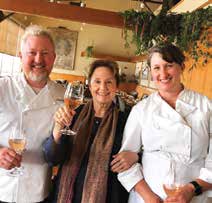
Alice Waters (middle) with Chez Panisse Café Chefs Nathan Alderson and Beth Wells at Greens on August 5
As part of its star chef-studded 40th Anniversary Dinner Series, Greens Restaurant recently featured Alice Waters of Chez Panisse, a restaurant that is in its 48th year. There are many reasons behind the inarguable success of these two venerable restaurants, but we would like to offer one that is not often mentioned: trees.
Chez Panisse’s Bunya
Chez Panisse is dominated by a member of one of Earth’s oldest tree families: the Araucariacieae. Guests walk under a massive Araucaria bidwillii (aka Bunya pine), which practically cradles those who sit in the porches of the downstairs restaurant and upstairs Café. It is both comforting and awe-inspiring to sit underneath its long branches, something that Native Americans and other populations did under similar trees in centuries past.
Less visionary restauranteurs would have cut the tree down, but Waters and Chez Panisse’s founders left it in place and did not just work around it, but designed the entry and other areas with the tree’s space and other needs in mind. All the more remarkable is that the restaurant is located on a busy urban street not far from UC Berkeley.
But it is Greens that is more on our minds now, given the Anniversary celebrations taking place through year’s end. The restaurant is literally grounded by late craftsman JB Blunk’s (1926–2002) vertical redwood monolith, simply titled “Greens.” Blunk’s daughter Mariah Nielson told the San Francisco Bay Times that her father created the piece “from a single 22-foot diameter stump of a fallen redwood from Mendocino.”
It begins with a giant tangle of burls skillfully carved on one side to create a partial arch. From that, in a near complete circle, juts a series of rustic tables and chairs—all handcrafted by Blunk from the warm-hued redwood. Should you be lucky enough to dine at those particular tables, you will become a living part of the masterwork.
Blunk’s apprentice, Bruce Mitchell, explained that as a near first step in the creation of the restaurant, “Greens” the monolith was bolted into the substrate before the concrete foundation was poured. That helps to explain why the hefty piece has not buckled the floor. Its open shape is inviting and promotes a sense of community in what could otherwise be a nondescript industrial space.
Two Earth Mothers +
Food activist Waters has been a champion of local, sustainable agriculture for over four decades. Whether readying her restaurant for a special night or signing an autograph as a favor for an ailing Bay Times family member, she works to live in the present and to engage her emotions and senses. “When I come in (to Chez Panisse), if I don’t feel something, I burn rosemary,” she said, for example, in the American Masters documentary about her life and achievements. When she feels the inexplicable “something,” her guests often do, too.
Greens, in turn, has been led by nationally acclaimed chef and author Annie Somerville. A pioneer in working directly with local, organic farmers (including Greens’ own Green Gulch Farm in Marin County), she and her team select the freshest and most delicious seasonal produce to bring to the table. Somerville first came to Greens in 1981, when she trained under Greens’ original chef Deborah Madison, and has served as Executive Chef since 1985.
Relatively new to Greens is Chef de Cuisine Denise St. Onge, who was brought in after Somerville announced her “semi-retirement.” St. Onge, who is half-Thai, was raised as a Buddhist and grew up both in the Bay Area and in Thailand. She told 7×7 earlier this year that she and her family came to Greens a lot when she was growing up: “I always thought it was a really beautiful restaurant and institution, and a very peaceful place.”

Mariah Nielson (left) with Bruce Mitchell, who worked as an apprentice under Nielson’s father JB Blunk. They are standing under the arch portion of Blunk’s redwood masterwork “Greens.”
A Feast for the Senses
St. Onge’s sentiment is shared by many others, especially given that Greens opened in 1979 as part of the San Francisco Zen Center, which includes not only Green Gulch Farm but also the Tassajara Zen Mountain Center. Located at historic Fort Mason Center in a former machine shop, Greens overlooks the San Francisco Marina with sweeping views of the Golden Gate Bridge and the Marin Headlands.
During the Waters’ guest night, heavy fog blanketing much of the Bay Area parted over the Golden Gate Bridge just in time for a spectacular sunset. It is little wonder that countless couples have fallen in love both at and with Greens.
Core Values
In 1996, Waters established the Chez Panisse Foundation, later renamed the Edible Schoolyard Project. The organization’s mission, Waters and her team state, “is to build and share a national edible education curriculum for pre-kindergarten through high school. This vision includes gardens and kitchens as interactive classrooms for all academic subjects, and a sustainable, delicious, and free lunch for every student.”
The stated core values of Greens are “Generosity, Patience, Virtue, Energy, Focus and Connection.” This might all seem too woo-woo for these fast-paced, fast food times, but for those who surrender to the lull of the Bay water as it laps near the windows of Greens and then slow their schedules for the restaurant’s unrushed meals, the potential rewards are many.
Greens’ Anniversary Dinner Series
Waters (and her team from the Chez Panisse Café) was the guest chef at Greens on August 5. She was preceded by Reem Assil of Reem’s California on July 9.
Upcoming guest chefs are the following:
To make a reservation, please go to: https://greensrestaurant.com/celebrating-40-years/
For More Information
JB Blunk: https://www.jbblunk.com/About
Chez Panisse: https://www.chezpanisse.com/reservations/
The Edible Schoolyard Project: https://edibleschoolyard.org/berkeley
Permanent Collection (Nielson’s business with Waters’ daughter Fanny Singer; it is a line of clothing, accessories and objects based on historical and contemporary originals): https://permanentcollection.com/
Recent Comments